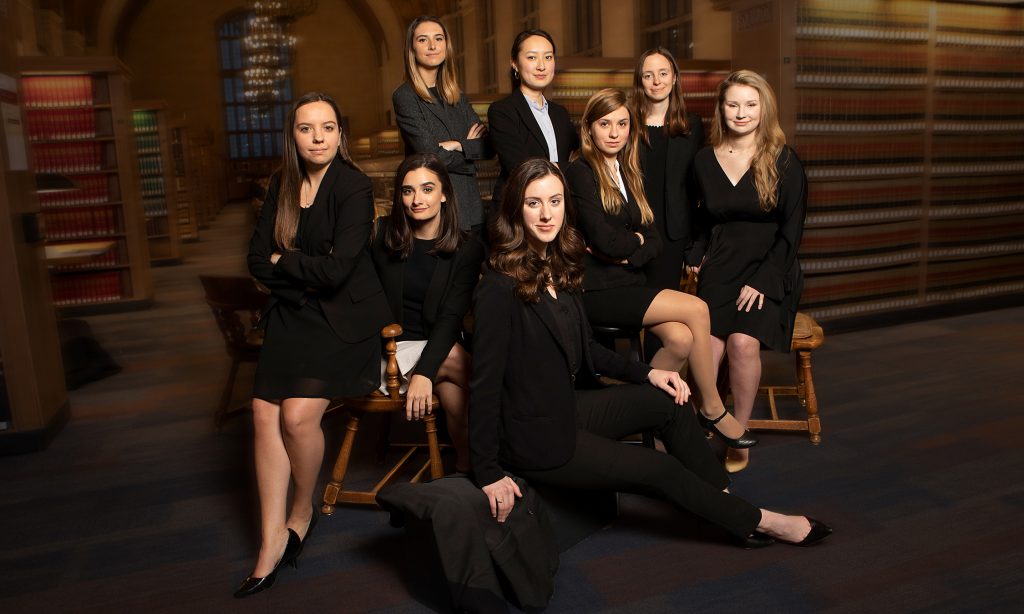Cornell Law Review's New All-Women Board Speaks Volumes, Editor Says
Lauren Kloss, who was recently elected as the next editor-in-chief of the Cornell Law Review, said the election of an all-female executive board at the flagship journal of a top law school is the latest signal that women are edging toward parity in the legal profession.
February 06, 2019 at 02:37 PM
5 minute read
 The Cornell Law Review has elected what is believed to be the first all-female executive board at a top law school. Courtesy photo.
The Cornell Law Review has elected what is believed to be the first all-female executive board at a top law school. Courtesy photo.
The Cornell Law Review made a splash this weekend when it elected an all-female executive board—believed to be a first for a flagship journal at a top law school.
Like most other areas of the legal profession, men have long dominated law review participation and the leadership of those journals—which are key stepping-stones to judicial clerkships, prestigious law firms jobs and powerful government positions. A 2010 survey of law review participation found that women made up 44 percent of law review staffers and 33 percent of those in leadership roles.
But times are changing. After dipping below the 50 percent mark in the early half of the decade, female enrollment at American Bar Association-accredited law schools hit 52 percent this fall. And women are especially well represented at the top 20 law schools.
Law.com caught up with Lauren Kloss, a second-year student who was elected to be the Cornell Law Review's next editor-in-chief, to talk about the significance of an all-female executive board and what that says about how legal education is changing. Her answers have been edited for length.
 Lauren Kloss.
Lauren Kloss. What was your reaction at the end of the election when you saw the new executive board was all women? We were all so excited. It wasn't something planned, and it wasn't something I think we realized until it got to the end and we were up there standing together. We had our male classmates running, and everyone was questioning them as well and participating in the general election process. But it felt like we had done something larger than what we originally expected.
So you had no sense ahead of time that you'd end up with an all-female executive board? Our year, I think, is maybe 52 or 53 percent women, so we knew we were coming in with a strong female class. Within the law review, we have a very strong female class. Going into that week, we could see who was thinking of running for the various positions. Of course we had male classmates running. But we had no idea until the day of, what would come to be. It was wonderful to see the strong presence of women running, and that many women in our class felt empowered to run. And it was wonderful to see our classmates recognizing how capable this slate of students was and that they trusted them to bring the Cornell Law Review into its 105th volume.
What is the process to get elected to the executive board? We started with editor-in-chief. We had three candidates go up—myself and two others, a male and female. We gave a short speech of why we wanted to be editor-in-chief and what we thought we could bring. Then it was about an hour and a half or two hours of question and answer. It ranged from how we would handle conflict within the student body to what our vision was for the upcoming year and if we had a favorite article we worked on as an associate. It was a grueling two hours. They took about 45 minutes to deliberate then brought us back in to announce the decision. Any contested positions thereafter followed the same process, though it was not as long. There are eight total positions on the executive board.
So this is a first for a top law review, it seems? As far as we know. No one has come forward since the Above the Law article landed. I'd certainly be interested if there were anyone else. We are quite proud to think of ourselves as the first all-female executive board. Mary Donlon was the first female editor in chief of any U.S. law review, and it was at the Cornell Law Review in 1919-20. She was the editor-in-chief for Volume 5, so we're at the 100th anniversary of that momentous occasion.
Do you think the new executive board will function any differently because you are all women? Will you bring a different dynamic? I wouldn't say it will function any differently. We weren't elected because we are female. We were elected because our classmates saw that we would be the best fit for the positions. The fact that we are potentially the first top law school to have this will add a bit more excitement. I have no doubt that we'll be just as capable at fulfilling all the roles and creating a body of work for publication that we are all proud of.
Do you think this says something larger about how legal education is changing? Absolutely. I knew going in that the legal field in general is very male dominated. You can see that in the news. I think we are seeing women professors advance in legal academia. We see which firms are announcing all-female partner classes. I think we feel that we are a part of that movement—that women are a strong force in the legal field and will continue to prove themselves.
How do think the Cornell Law Review is doing on racial diversity? I think there are always more steps to take. We have a woman from Brazil—a Latina—and we have an Asian-Canadian woman who is also on the executive board. I think the board in general will continue with our initiatives to bring greater diversity in terms of the student body, in terms of the authors we decide to publish, and in terms of the subject matter of the pieces we take on. It's a very open discussion and I think it's an important one to thread though each of those issues.
This content has been archived. It is available through our partners, LexisNexis® and Bloomberg Law.
To view this content, please continue to their sites.
Not a Lexis Subscriber?
Subscribe Now
Not a Bloomberg Law Subscriber?
Subscribe Now
NOT FOR REPRINT
© 2025 ALM Global, LLC, All Rights Reserved. Request academic re-use from www.copyright.com. All other uses, submit a request to [email protected]. For more information visit Asset & Logo Licensing.
You Might Like
View All
Labaton’s Eric Belfi on Running Case Investigation, Analysis and Delaware Presence

Litigation Leaders: Quinn Emanuel's Michael Carlinsky on Training Associates to Think and Act Like Trial Lawyers

Innovation Award Individual Finalist: Charlie Hernandez, My Pocket Lawyer
1 minute read
Trending Stories
- 1Critical Mass With Law.com’s Amanda Bronstad: LA Judge Orders Edison to Preserve Wildfire Evidence, Is Kline & Specter Fight With Thomas Bosworth Finally Over?
- 2What Businesses Need to Know About Anticipated FTC Leadership Changes
- 3Federal Court Considers Blurry Lines Between Artist's Consultant and Business Manager
- 4US Judge Cannon Blocks DOJ From Releasing Final Report in Trump Documents Probe
- 5White & Case KOs Claims Against Voltage Inc. in Solar Companies' Trade Dispute
Who Got The Work
J. Brugh Lower of Gibbons has entered an appearance for industrial equipment supplier Devco Corporation in a pending trademark infringement lawsuit. The suit, accusing the defendant of selling knock-off Graco products, was filed Dec. 18 in New Jersey District Court by Rivkin Radler on behalf of Graco Inc. and Graco Minnesota. The case, assigned to U.S. District Judge Zahid N. Quraishi, is 3:24-cv-11294, Graco Inc. et al v. Devco Corporation.
Who Got The Work
Rebecca Maller-Stein and Kent A. Yalowitz of Arnold & Porter Kaye Scholer have entered their appearances for Hanaco Venture Capital and its executives, Lior Prosor and David Frankel, in a pending securities lawsuit. The action, filed on Dec. 24 in New York Southern District Court by Zell, Aron & Co. on behalf of Goldeneye Advisors, accuses the defendants of negligently and fraudulently managing the plaintiff's $1 million investment. The case, assigned to U.S. District Judge Vernon S. Broderick, is 1:24-cv-09918, Goldeneye Advisors, LLC v. Hanaco Venture Capital, Ltd. et al.
Who Got The Work
Attorneys from A&O Shearman has stepped in as defense counsel for Toronto-Dominion Bank and other defendants in a pending securities class action. The suit, filed Dec. 11 in New York Southern District Court by Bleichmar Fonti & Auld, accuses the defendants of concealing the bank's 'pervasive' deficiencies in regards to its compliance with the Bank Secrecy Act and the quality of its anti-money laundering controls. The case, assigned to U.S. District Judge Arun Subramanian, is 1:24-cv-09445, Gonzalez v. The Toronto-Dominion Bank et al.
Who Got The Work
Crown Castle International, a Pennsylvania company providing shared communications infrastructure, has turned to Luke D. Wolf of Gordon Rees Scully Mansukhani to fend off a pending breach-of-contract lawsuit. The court action, filed Nov. 25 in Michigan Eastern District Court by Hooper Hathaway PC on behalf of The Town Residences LLC, accuses Crown Castle of failing to transfer approximately $30,000 in utility payments from T-Mobile in breach of a roof-top lease and assignment agreement. The case, assigned to U.S. District Judge Susan K. Declercq, is 2:24-cv-13131, The Town Residences LLC v. T-Mobile US, Inc. et al.
Who Got The Work
Wilfred P. Coronato and Daniel M. Schwartz of McCarter & English have stepped in as defense counsel to Electrolux Home Products Inc. in a pending product liability lawsuit. The court action, filed Nov. 26 in New York Eastern District Court by Poulos Lopiccolo PC and Nagel Rice LLP on behalf of David Stern, alleges that the defendant's refrigerators’ drawers and shelving repeatedly break and fall apart within months after purchase. The case, assigned to U.S. District Judge Joan M. Azrack, is 2:24-cv-08204, Stern v. Electrolux Home Products, Inc.
Featured Firms
Law Offices of Gary Martin Hays & Associates, P.C.
(470) 294-1674
Law Offices of Mark E. Salomone
(857) 444-6468
Smith & Hassler
(713) 739-1250






